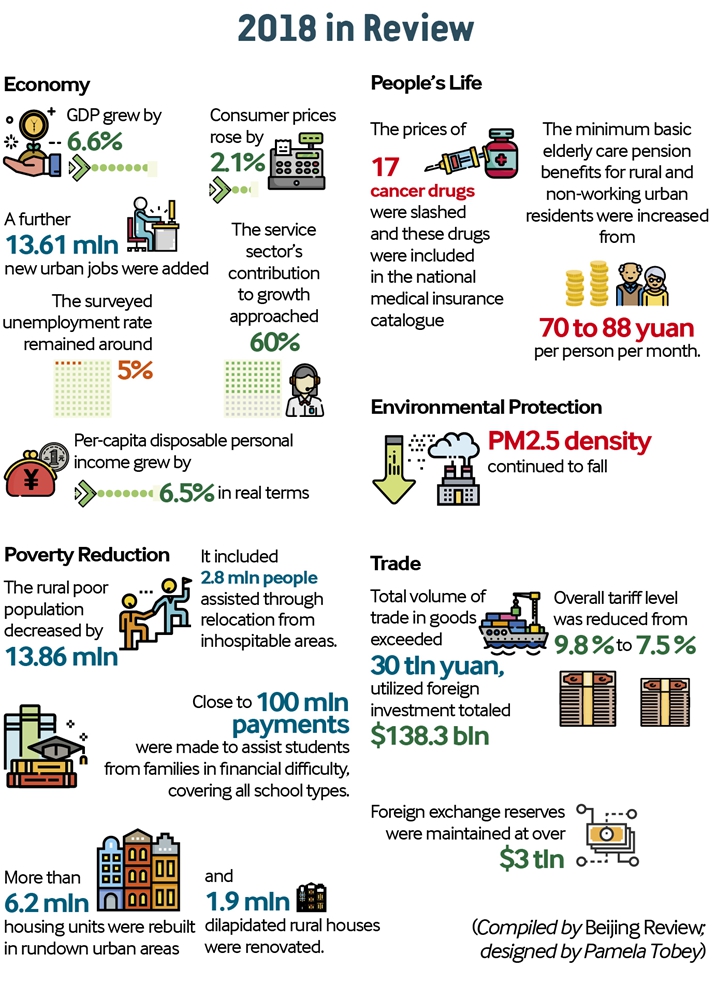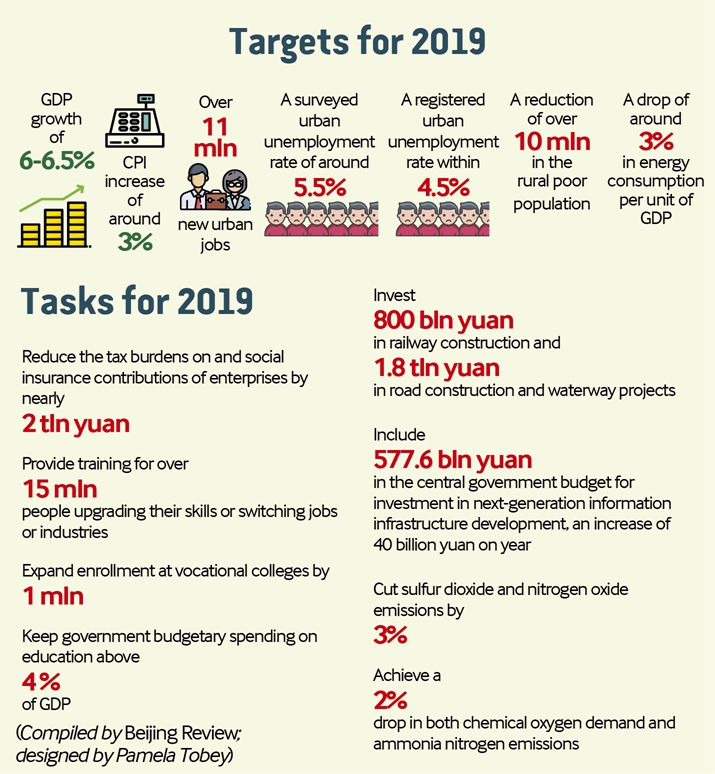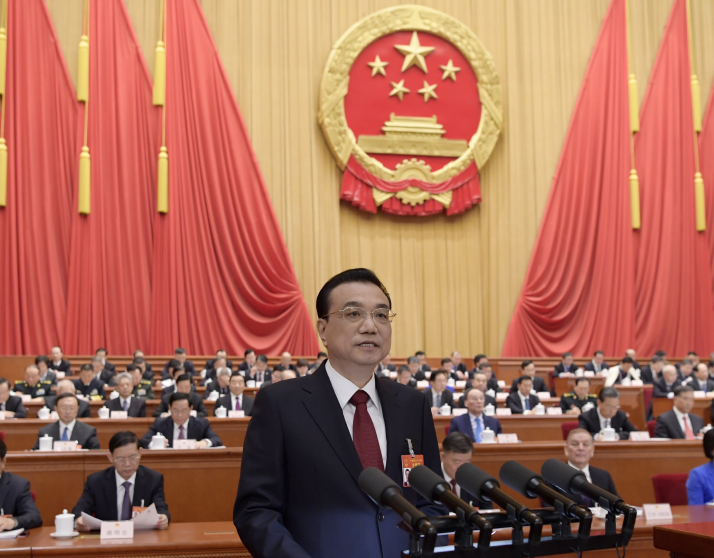Premier Li Keqiang delivers the Report on the Work of the Government at the Second Session of the National People's Congress in Beijing on March 5 (XINHUA)
At the opening of the Second Session of the 13th National People's Congress in Beijing on March 5, Premier Li Keqiang delivered the Report on the Work of the Government, which reviewed China's economic and social development in 2018 and put forward proposals for government work in 2019. The following are the highlights of the report:

2018 in Review
The main economic indicators were kept within an appropriate range:
- Gross domestic product (GDP) grew by 6.6 percent, exceeding 90 trillion yuan.
- Consumer prices rose by 2.1 percent.
- In the balance of payments a basic equilibrium was maintained.
- A further 13.61 million new urban jobs were added, and the surveyed unemployment rate remained stable at a comparatively low level of around 5 percent.
Economic structure was further improved:
- Consumption continued to play an increasing role in driving economic growth.
- The service sector's contribution to growth approached 60 percent. Growth in hi-tech industries and equipment manufacturing outstripped that of other industries. Harvests were again good.
- Energy consumption per unit of GDP fell by 3.1 percent.
New growth drivers grew rapidly:
- A number of major scientific and technological innovations were made, like the Chang'e-4 lunar probe.
- Emerging industries thrived and traditional industries saw faster transformation and upgrading.
- Business startups and innovation continued to surge nationwide, with an average of over 18,000 new businesses opening daily and the total number of market entities passing the 100-million mark.
New breakthroughs were made in reform and opening up:
- Institutional reforms of both the State Council and local governments were implemented smoothly. New progress was made in reform in key fields.
- The negative list system for market access was put fully into effect. Reforms to streamline administration and delegate power, improve regulation, and upgrade services were intensified, and the business environment rose significantly in international rankings.
- Opening up was expanded on all fronts, and joint efforts to pursue the Belt and Road Initiative (BRI) made significant headway.
- The first China International Import Expo was a success. Work began on building the China (Hainan) Pilot Free Trade Zone.
- China's total volume of trade in goods exceeded 30 trillion yuan, and utilized foreign investment totaled $138.3 billion, ranking China first among developing countries.
The three critical battles got off to a good start:
They refer to the battles against potential risks, poverty and pollution.
- Major risks were forestalled and defused. The macro leverage ratio trended toward a stable level; the financial sector was generally stable.
- Precision poverty alleviation made significant progress, with the rural poor population reduced by 13.86 million, including 2.8 million people assisted through relocation from inhospitable areas.
- Pollution prevention and control was strengthened, and PM2.5 density continued to fall. Marked achievements were made in ecological conservation.
Living standards continued to improve:
- Per-capita disposable personal income grew by 6.5 percent in real terms.
- The threshold for individual income tax was raised and six special additional deductions were created.
- Support for basic elderly care and basic health care was strengthened. Close to 100 million payments were made to assist students from families in financial difficulty, covering all school types.
- More than 6.2 million housing units were rebuilt in rundown urban areas and 1.9 million dilapidated rural houses were renovated.
- Urban and rural living standards continued to rise.

Tasks for 2019
Continue to develop new and improved approaches to macro regulation and keep the main economic indicators within an appropriate range
- Implement larger-scale tax cuts.
- Significantly reduce enterprise contributions to social insurance schemes.
- Ensure tax and fee cuts are fully implemented.
- Work hard to alleviate the difficulties faced by enterprises in accessing affordable financing.
- Make effective use of local government bonds.
- Use multiple channels to achieve stable and expanding employment.
Work to energize market entities and improve the business environment
- Cut government approvals and improve services to create a favorable environment for investment and business startups.
- Conduct impartial regulation to promote fair competition.
- Carry out reforms to promote reduction in business-related charges.
Continue to pursue innovation-driven development and foster new growth drivers
- Work to transform and upgrade traditional industries.
- Work to speed up the growth of the emerging industries.
- Increase the ability to provide scientific and technological support.
- Do more to encourage startups and innovation nationwide.
Stimulate the development of a robust domestic market and keep unlocking the potential of domestic demand
- Promote steady growth in consumption.
- Expand effective investment as appropriate.
Make solid progress in poverty alleviation and rural revitalization and move closer to completing the tasks of building a moderately prosperous society in all respects
- Beat poverty with precision alleviation.
- Improve agriculture, particularly grain production.
- Take solid steps to upgrade rural infrastructure.
- Deepen comprehensive rural reforms.
Promote coordinated development across regions and improve the quality of new urbanization
- Improve the layout of development for all regions.
- Advance new urbanization.
Strengthen pollution prevention and control, enhance ecological improvement and make big advances in green development
- Keep intensifying efforts to prevent and control pollution.
- Strengthen green and environmental protection industries.
- Step up efforts to protect and restore ecosystems.
Deepen reforms in key sectors and speed up the improvement of market mechanisms
- Accelerate state capital and state-owned enterprise reforms.
- Work for big improvements in the development environment for the private sector.
- Deepen reforms of the fiscal, taxation and financial systems.
Promote all-around opening up and foster new strengths in international economic cooperation and competition
- Promote stable and higher quality growth of foreign trade.
- Do more to attract foreign investment.
- Promote the joint pursuit of the Belt and Road Initiative.
- Promote trade and investment liberalization and facilitation.
Speed up the development of social programs to better ensure and improve living standards
- Develop more equitable and higher quality education.
- Ensure access to basic medical and health services.
- Improve the social security system and related policies.
- Work to enrich the intellectual and cultural life of the people.
- Strengthen social governance and explore new ways to conduct it.
Copyedited by Rebeca Toledo
Comments to luyan@bjreview.com
